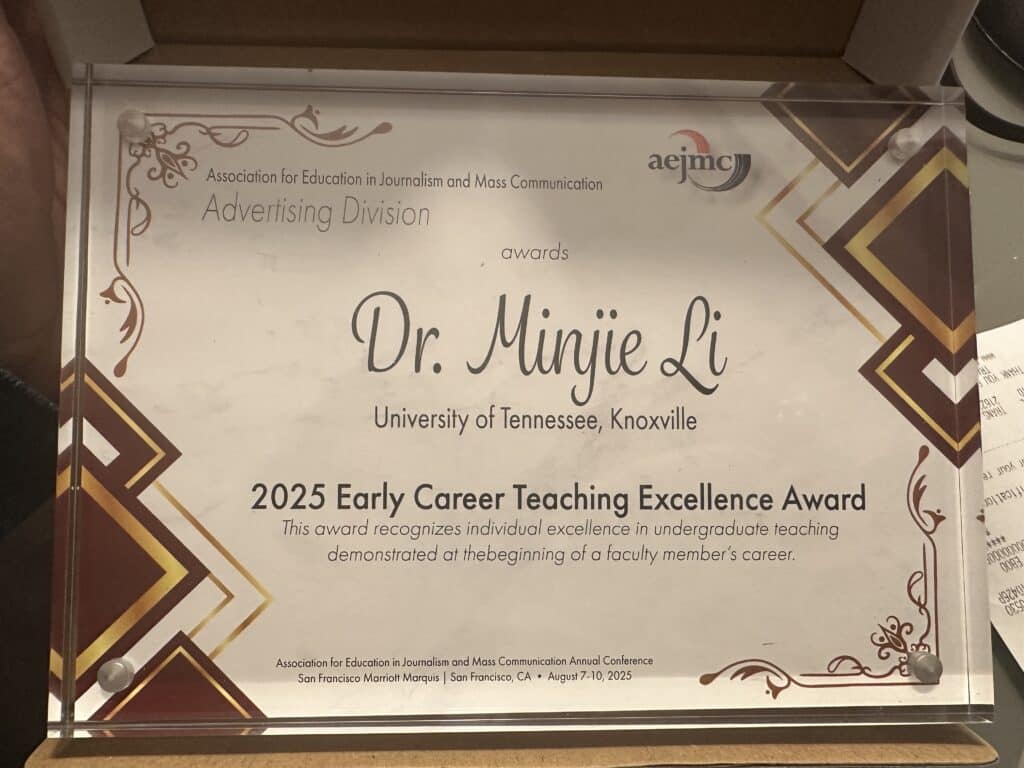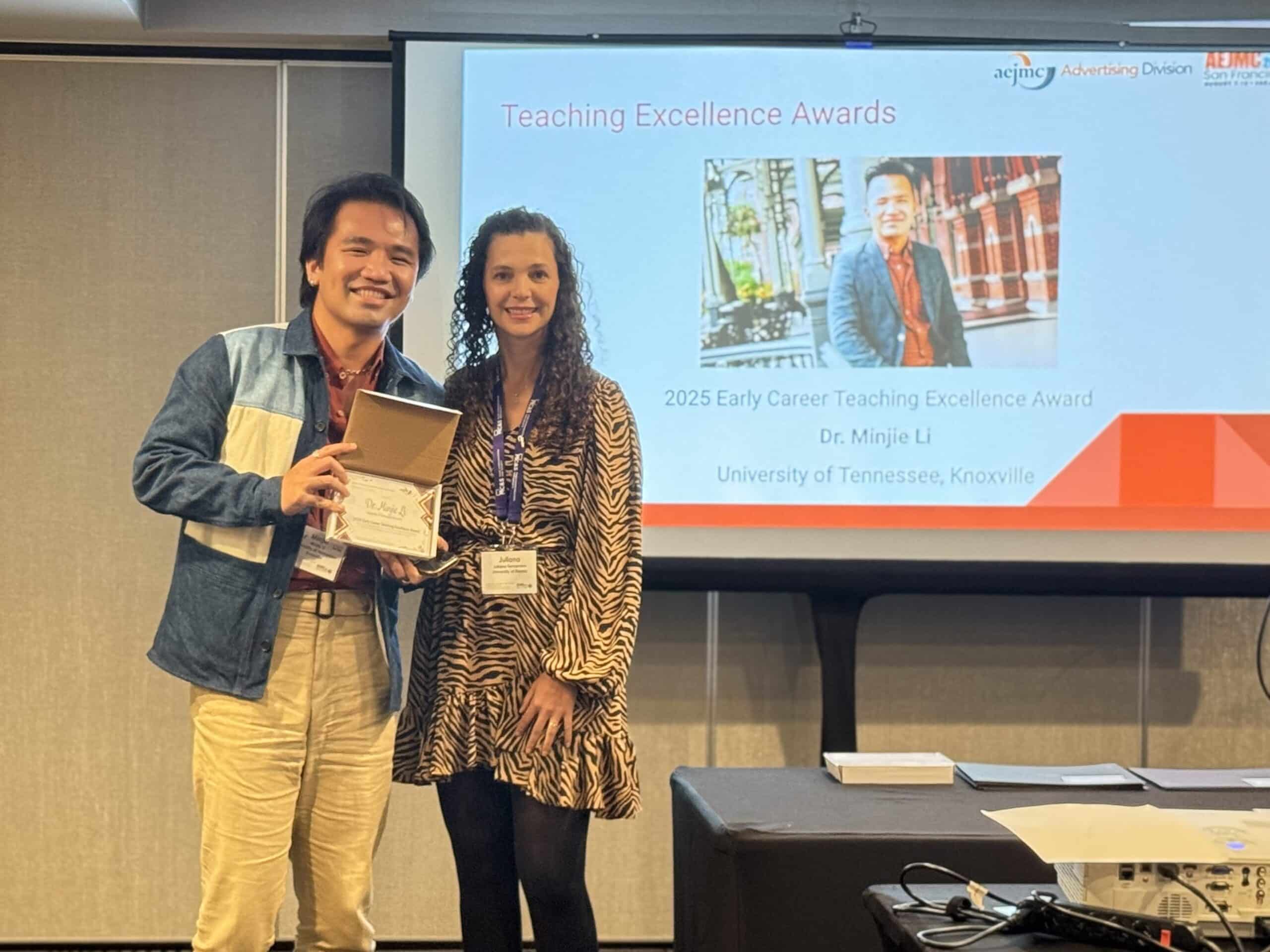Associate Professor Minjie Li was recognized with the Early Career Teaching Excellence Award from the Advertising Division of the Association for Education in Journalism and Mass Communication (AEJMC) at this year’s conference in San Francisco. This award honors outstanding undergraduate teaching and is given to individuals who have completed at least two full academic years by the time of nomination.
Upon learning about his award, Li expressed his surprise and gratitude, saying, “Honestly, I was shocked and emotional. I was surprised because this award attracts applicants and nominees from around the globe, and there are many excellent and deserving advertising educators in the field. As someone who finds deep joy in teaching and witnessing students grow, being recognized for that work is incredibly meaningful.”
Li shared that the first few people he shared the news with were students who wrote testimonials and his nominator, Tombras School Director and Professor Courtney Childers.
He stated, “I wanted to let them know that their belief in my teaching clearly resonated with the award committee.”
Childers said, “Dr. Li is a highly engaged, well-respected educator in the Tombras School. He is passionate about the student experience as he challenges students to think critically and creatively. It’s an honor to be his colleague, and I am so happy his teaching excellence has been recognized by one of our largest international academic organizations.”
AEJMC is a nonprofit organization dedicated to promoting high standards in journalism and mass communication education, fostering diverse communication research, supporting the integration of multicultural perspectives in the classroom and curriculum, and defending freedom of communication to enhance professional practices and inform the public better. The recipient of this award is chosen by an award committee comprised of former award recipients and experts in the field from across the country.
Li views the professional validation from respected scholars in the field as an honor. He hopes that receiving this award will enhance the visibility of the Tombras School of Advertising and Public Relations, along with the College of Communication and Information.
“Being recognized by esteemed colleagues in my field is a special honor. It reaffirms my teaching methods. I hope my recognition can shine a light on the meaningful and forward-thinking education taking place here at the Tombras School. Personally, this award motivates me to continue innovating,” he shared.

Li emphasized that the impact of the University of Tennessee, Knoxville’s mission and its vibrant student body significantly influences his teaching approach as he advocates for access to opportunities and high-quality education for all students. Li teaches courses in advertising, creative strategy, multicultural and prosocial strategic communication, visual communication, and social media strategies and tactics. His teaching philosophy focuses on creating an environment where students can critique, challenge, and create.
“I want them to go beyond simply learning existing material. I encourage them to challenge and reinvent what they have learned to produce portfolio-worthy work and to solve problems creatively. I strive for them to create work that is strategic, innovative, and socially meaningful. Real learning begins with the ability to critique constructively and to receive critiques, and I aim to cultivate a classroom where students can confidently engage in that process,” he stated.
In accepting this award, Li’s humility and gratitude were evident as he shared his passion for the field and his dedication to his students.
“I don’t teach students to stand out; I teach to help them stand out. Innovation in my classroom is an ongoing and responsive process. For example, I use a flipped classroom model in my Advertising Issues course and an agency-style creative workflow in Creative Strategy. These approaches evolve as student needs and industry demands change,” he said.
Li explains that his relationship with his students extends beyond the classroom, cultivating connections in the hallways and through mentorship.
“I believe that providing students with mentorship outside of the classroom is just as important as mentoring them inside a specific course,” Li stated. “I love seeing students’ faces light up after we have conversations exploring and identifying their strengths to professional opportunities. I enjoy helping students build their portfolios, apply for prestigious fellowships or internship programs, navigate the job market, supervise their submissions for student advertising competitions, and nominate deserving students for external awards while connecting them with external opportunities. While providing mentorship is time-consuming, it allows me to get to know my students on a personal level and understand the professional realities they are facing. What I learn in this process helps me better support students seeking mentorship in the future.”
Li also acknowledges that all students come from different backgrounds and have varied experiences. He uses empathy to encourage students to dream and go beyond their comfort zones.
“Working at a public institution like UT, we have students from all walks of life. Many of them hold multiple jobs outside of school, are primary caretakers of their families, are single parents, or struggle with mental health, among other challenges. These additional responsibilities can impact students’ performance and limit their career trajectories. Students don’t always ask for help, as seeking assistance is often framed as a weakness. It is important for me to be observant and work with students to ensure they can succeed in my class. Therefore, I also mentor students to pursue professional programs that can elevate their opportunities, help them network, or simply help them envision possibilities beyond their current situations. It’s difficult to dream big when facing struggles. As a public institution, we need to ensure that all students have access to opportunities and a high-quality education,” he said.
His tactics have been quite successful, as he has witnessed several of his students secure noteworthy internships, fellowships, and numerous awards for their work.
Li explained, “I am always proud of my students’ achievements. My students have received student ADDY awards year after year, been accepted into prestigious fellowships and internship programs—such as the 4A’s Multicultural Advertising Intern Program (MAIP) and the International Radio & Television Society Foundation (IRTS) program—and secured jobs at top agencies and in-house marketing units for leading brands. Many students even apply the transferable skills they have learned in advertising to pursue careers in fields like interior design and architecture.”
With his core principles of inclusivity, critical thinking, creativity, and constructive critique, Li highlights student empowerment and real-world relevance in his work, remaining committed to socially meaningful and strategic education.
“I co-create the learning environment with my students. I encourage them to integrate their unique lived experiences with data-driven decision-making. I also employ diverse teaching modalities to accommodate different learning styles. Building community is essential; I love seeing students form lasting networks that extend beyond the classroom. I want my students to leave my classroom not only equipped with knowledge and skills but also with a network of peers for future collaboration. Many students take the initiative to continue working together as they build their portfolios and navigate job searches, forming a support system for each other. Knowing this always puts a smile on my face,” he remarked.
Looking ahead, Li notes that there is no “magic formula” for teaching. He takes pleasure in the success he and his students have achieved over the years and enjoys witnessing students present their creative campaigns, lead discussions, and cheer each other on during the process.
His advice to other educators early in their careers is, “Good teaching results from hard work, rigor, time, care, and commitment. Learning from students is as vital as the knowledge we impart to them.”

